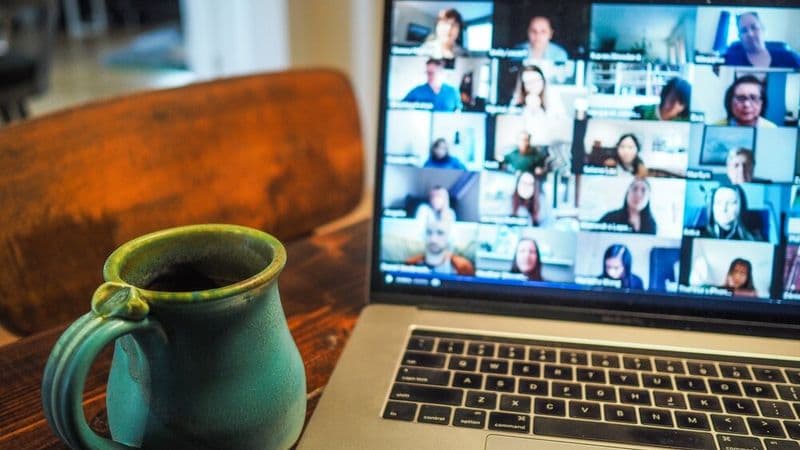The Future of Work: A Conversation with A Sustainability Expert
KraftyLab CEO Boris Sotnikov sat down with Jeana Wirtenberg, a sustainability expert to discuss a future of work that is aligned with sustainability.
KraftyLab Team

Expert Series: A Conversation with Sustainability Expert Jeana Wirtenberg
Here at KraftyLab, we believe in evidence-based learning, in listening to experts, and in working as a unit to become better individuals for ourselves, our communities, and our businesses. Over the last several months, we have been developing a partnership with Transitioning to Green, a leading sustainability consulting, coaching, and training agency.
Our mission is to share the knowledge we have gained and to provide insight into the kind of information, wisdom, and empowerment your company too can receive when working with sustainability experts through our corporate training programs.
There are clear trends in the workforce and labor market that need to be discussed. The shifting dynamics between employees and management, volatile changes to business practices, and the inevitable impact of hybrid work and the return to the office. We need to respond accordingly to ensure our businesses continue to thrive.
KraftyLab CEO and Co-Founder Boris Sotnikov sat with President and CEO of Transitioning to Green Jeana Wirtenberg to discuss her journey to sustainability and share insight into changing business practices across industries. [Author’s Note: This interview has been edited and condensed for clarity.]
1. Question: How did you find your way into sustainability?
Answer: About 20 years ago, I had an epiphany. I wanted to apply my psychology and my human resources background to build more sustainable enterprises. I discovered the world of sustainability and I wanted to bring into focus the human side, often the missing component in the conversation. I wanted to marry the world of HR with sustainability using my background in psychology and business. In 2009, we launched TTG and began providing our consulting and sustainability training, and leadership development in sustainability. We also provide coaching to help people move into and contribute to the emerging green economy.
2. Question: As we emerge into the green economy, what gives you hope for that future? As we transition into the future of work and a greener world hopefully, what are the great challenges you see that we will face?
Answer: I am totally inspired by the next younger generations of Millennials and Gen Z. Their resilience, courage, and adaptability are something I see in my children and my students all the time. Unfortunately, we are stuck in an old way, in a very obsolete way of doing things, we want everything to be the way it was. The challenge is for business leaders at every level, managers, and employees to commit to making a future where everyone, people and planet included can thrive forever. It is possible and it is up to us to make it happen.
Note for Context: Jeana is a professor at Rutgers Business School where she teaches Sustainability-Aligned Leadership & Strategy in their Business School.
3. Question: When you think about organizations in the twentieth vs the twenty-first century, what differences do you see? What signs do you see that business practices are transforming? What about that gives you hope for the future?
Answer: We are at an inflection point in the role of business in society. Many employees are burned out and disengaged. We have an opportunity to literally redefine the very meaning and purpose of work. There are many signs that business is transforming, and the goal should be to move towards what we call stakeholder capitalism. That is where we consider all stakeholders as equally important, that includes employees, consumers, community, investors, society at large, and the planet.
4. Question: How do sustainability and the UN sustainable development goals fit into that transformation?
Answer: The United Nations SDGs help define some of the most critical challenges the world is facing today. We believe that corporations have tremendous untapped potential to help solve all the major societal problems by working together across sectors. That includes poverty, inequality, climate action, and even peace and justice.
5. Question: Have you seen any lessons from nature in how we need to lead organizations today and into the future?
Answer: Absolutely. There is a chapter in my book that uses a tree as a metaphor for leadership. A tree produces oxygen, creates habitat, builds healthy soil, uses the sun’s energy to make food, and changes with the seasons. It self-replicates. It’s a living breathing regenerative, self-sustaining organism, existing in harmony with nature and other living beings in its natural habitat and its community.
In stark contrast, for centuries our organizations have largely been built on a machine model. Machines have parts, they have inputs and outputs, and people are cogs in the machine. Most importantly a machine is not alive. It does not generate, regenerate, or give lives to people or the planet. It is quite the opposite.
I believe the machine model may have been appropriate for the industrial age one hundred years ago, but it is no longer relevant for the twenty-first century or beyond. In fact, it may be one of the chief reasons underlying the astounding lack of engagement we see in so many organizations. The perpetuation of the machine model is a deadening force, with the unintended consequence that it kills all the life force in people, businesses, and the planet.
6. Question. Can you describe what you see as the essential qualities of culture for sustainability?
Answer: If every employee has a personal goal towards the company’s larger sustainability efforts, they can begin to solve some of our most intractable problems. Sometimes, when managers make all the decisions that deal with sustainability it can be difficult to conceptualize. Employees need to have an active role in this shift in culture.
There are essential elements that help develop a culture of sustainability within an organization. These include sustainable values, seeing yourself and your organization in the context of community, society, and the earth. Next, sustainable mindsets, such as being appreciative of seeing abundance all around us, the beauty of nature, taking actions consistent with your values, and not being stopped by fear. Leadership with purpose is key, you need to see your organization as a living system and treat it as such.
You can only build culture through employee engagement. This is created through being inclusive, building agility, resilience, and using games and creative team-building experiences and competitions just like we are doing with KraftyLab. Being open to learning, embedding sustainability throughout reskilling and development, being curious, listening deeply and asking profound questions. Lastly, core values of diversity, inclusion, and social justice, being sensitive to cultural differences, and demonstrating a deep caring for all people. All of these need to be addressed in the process of building culture.
7. Question: You are leading a major cross-sector initiative on the future of work, at Rutgers University and beyond, what are your thoughts on the future of work? And how should businesses reinvent themselves to inspire current and future generations?
Answer: I believe this is a pivotal moment in time for re-engaging and re-skilling for the next decade and beyond. Our focus should be affording workers the opportunity to contribute to society’s greatest challenges as creating a sustainable future is the biggest challenge facing humanity. You should offer the opportunity for participating directly and indirectly in solving these challenges and provide the much-needed meaning and purpose that Millennials and Gen Z workers seek.
Kathy Calvin, recently retired CEO of the United Nations Foundation described this situation as the first time since the industrial revolution that we have had the opportunity to redesign what work really means and to better line up our work with the 17 sustainable development goals.
We need to work on our worker’s skill set for the future including being collaborative and not competitive. We must be unafraid to stand up and speak up, we need to be resilient and learn how to recover from setbacks. We must work from a place of purpose and meaning and have a commitment to being a champion of sustainable development goals. Companies are increasingly looking for ways to keep their employees connected through mobile and remote tech, including, increasing skills through corporate training. Our partnership with KraftyLab opens our portfolio to a wider range of companies across more sectors.
8. Question: How does reskilling and upskilling, training, and development fit into that equation? What is the role of HR and leadership in this transition?
Answer: We need to build bridges between where we are, and what workers are looking for. Workers are quitting in droves for all the reasons I have covered. They are increasingly stressed out and burnt out and seeking meaning and purpose, as well as flexibility and work-life balance so it is our job to respond.
We address and deal with the great resignation by transforming work-life policies and workforce policies in the post-pandemic world. This requires a fundamental shift in policy and program design to open the door for all members of the workforce, current and future workers, particularly, low income and lower-skilled workers. They need better access to lifelong learning and opportunities to thrive in an increasingly dynamic workforce through upskilling or reskilling.
The newest term, out-skilling, is where companies sponsor training programs needed to help employees be more engaged with their current employer or even help them find another job or another career with another employer. Ultimately, you want your employees to be employable, to find the skills whether it’s here or someplace else.
9. Question: I have heard you speak about work as a calling, and I have heard people describe their work and jobs as soul-sucking. Can you elaborate on what you refer to as a calling and why it is so important for young people to find meaning and purpose in their work? Can everyone find a calling?
Answer: Absolutely. A lot of research has shown that finding meaning and purpose and connection to the purpose of the company is the most important thing that millennials say they want from a job. Yet, only a third of employees see their work as a calling, as a result, employees are frustrated and dissatisfied by the jobs and careers they do have.
There is an opportunity then for employers to support workers in fulfilling their values and purpose through their work in service of society. We have all these problems that need to be addressed, and we have all these people that want to contribute. We need to put these two together and ensure they are taught why and how and have the skills and capacity to enact change.
10. In recent times, we have increasingly heard the notion of ‘I want to be the boss of me’. What do you think is driving that sentiment and how can we do a better job of meeting employees’ needs and how we work daily?
Answer: We need to give employees the opportunity to find purpose, value, and meaning in their work. We need to give them more freedom and autonomy, and we need to give them the opportunity to make critical interconnections at the personal level.
People have a need to belong, have a need to feel an affinity and relationships at work, and that’s been a real missing through the pandemic. To cultivate these relationships, we need to rebuild a culture of respect and inclusion, we need to nurture their well-being and their mental health.
We need to help people develop the agility and fluidity to adapt to the constantly changing needs of the workplace. I believe our partnership with KraftyLab can empower companies and contribute to the improvement of workers’ responses to their clients, their companies, and the planet.
What are KEY the takeaways from this conversation?
Takeaway #1 – Companies need to be aware and act on this opportunity for structural and organizational change. The demand is there, and the workforce is willing to work alongside them to make a change.
Takeaway #2 – Sustainability is not a one-off conversation. You need to establish a foundation of common values and goals, so executives, management, and employees are all working towards. A united organization is more likely to be effective and successful.
Takeaway #3 – At the core of the future of work is employee feedback. Employees are being loud and clear on a global scale about the structural and organizational changes needed to make their work lives more fulfilling. We need to not only listen but enact change to motivate and inspire the workers of today and the future.
What is next?
Our collaboration with Transitioning to Green, and the feedback from our clients have shown a genuine interest in corporate sustainability training. We encourage you to begin the journey with your team to a more sustainable future for the wellbeing of our employees, companies, and communities.
Our Sustainability Programs and our Earth Day Retreat is the perfect foundation for a shift in culture. Schedule a call with our sales team and get ready to take your team on a journey of knowledge, fun, and inspiration.




